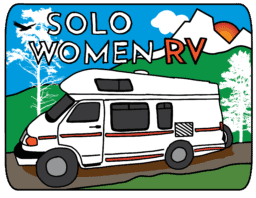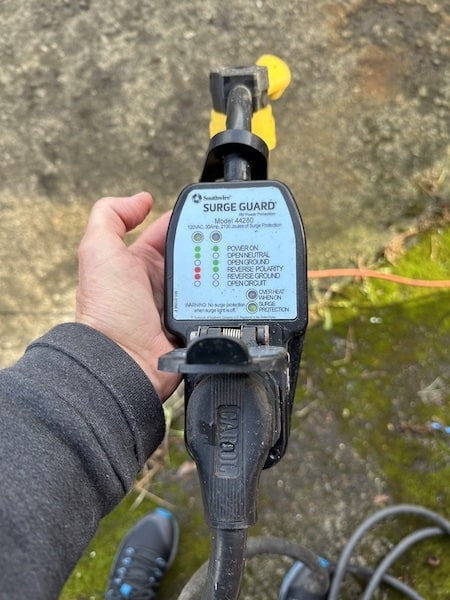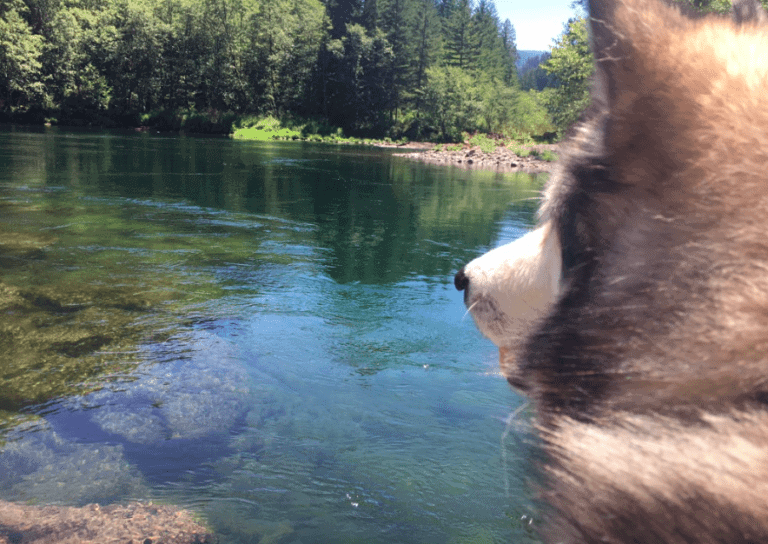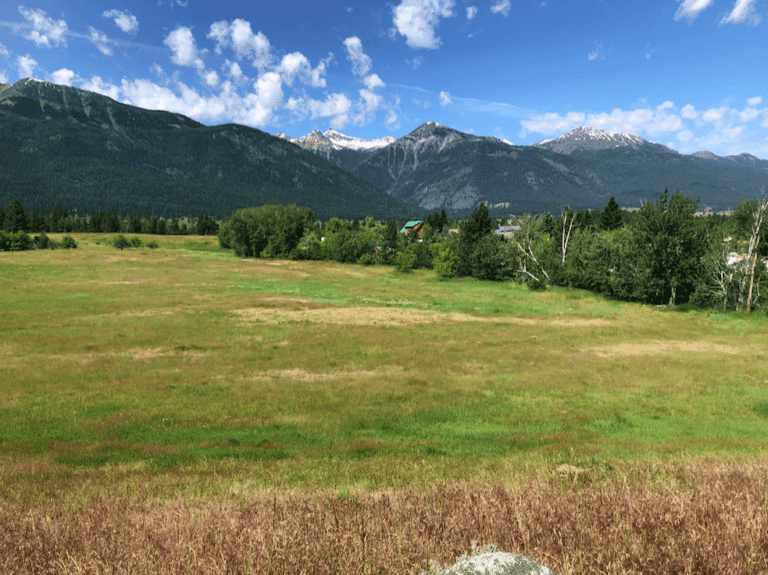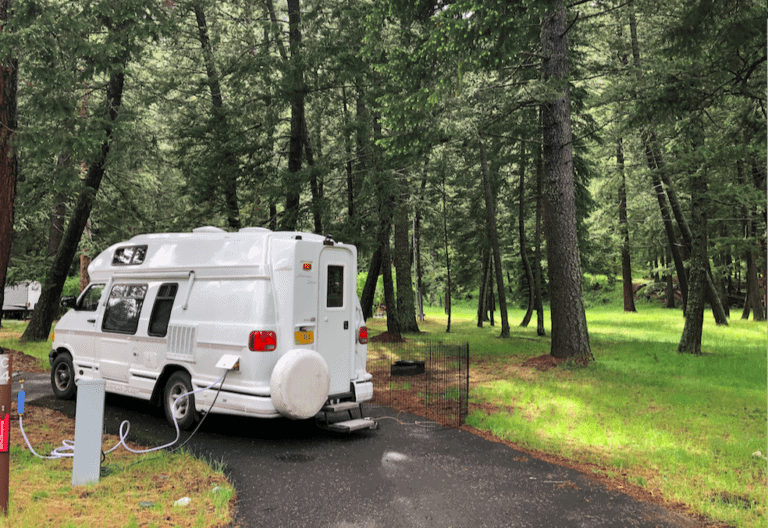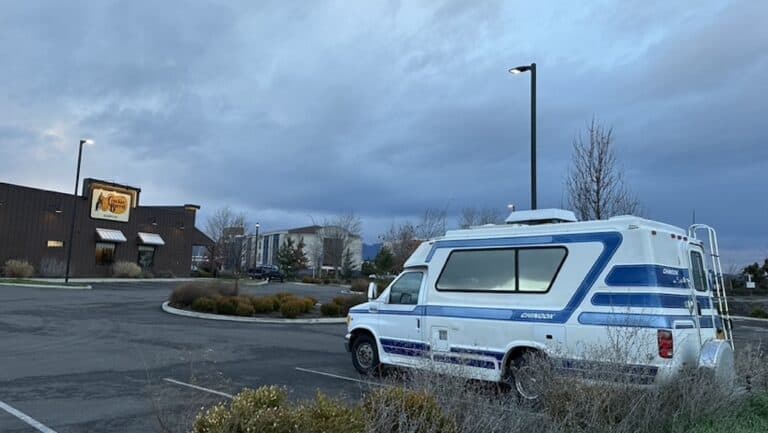Pros and Cons of Solo RV Living
They say solo women are the fastest growing group of RV travelers. And with good reason. There are so many positive and amazing things about solo RV travel. But there are also some downsides. In this blog post, we’ll dive deep into some of the pros and cons of solo RV living, so you can decide for yourself if solo RV travel and living is for you.
Personally, I love solo RV travel, but there are times when it would be nice to have someone else along. Let’s dive deeper into each. Some of these Pros and Cons will also apply to any kind or RV living, whether solo or with a partner or family.

Here are 15 Pros and Cons of Solo RV Living:
Pros of Solo RV Living
1. Freedom
If you were to ask 100 RVers why they got into the RV lifestyle in the first place, I bet 99 of them will list “freedom” somewhere on that list. When you live in an RV, you have the ability to move about, live in interesting places and change your scenery if you want something new. There is nothing like the feeling that you have complete control of your surroundings. There is a nostalgia about being on the open road and RV living offers plenty of opportunity to visit all of the iconic places in North America. Freedom to move about, is definitely one of the pros of RV living!
2. Community
Did she say community? We’re talking about solo RVing aren’t we? Yup, even as a solo RVer, finding community is a big perk of RV travel. Whether it’s through Facebook groups and other social media, solo RV meet ups and caravans, vanlifer gatherings or simply while you walk around the campground, you will meet like-minded friends and community. And I don’t mean just the kind of people you have brief chit-chat with while you’re walking your dog in a campground. Sure, there will be those people and they are great. But living a RV lifestyle, you will meet people who become life-long friends.
These are folks who understand the appeal of this lifestyle and get it when you talk about your GPS taking you on some scary windy road. They’re folks you can call or text when you’re parked solo at a busy truck stop and you just want to have a friendly reassurance.
Some people swear the friends they make in the RVing community are closer than the friends they had when they lived in houses. People have more time for one another, more time to hang out together and build meaningful friendships. Personally, I’ve developed some wonderful friendships in my travels. I’ve met up over and over with other solo travelers and created community with people I’ve camp hosted with.
Of course, friendships don’t magically happen. Like anything, it takes effort. One thing that seems to work is to give more than you take.
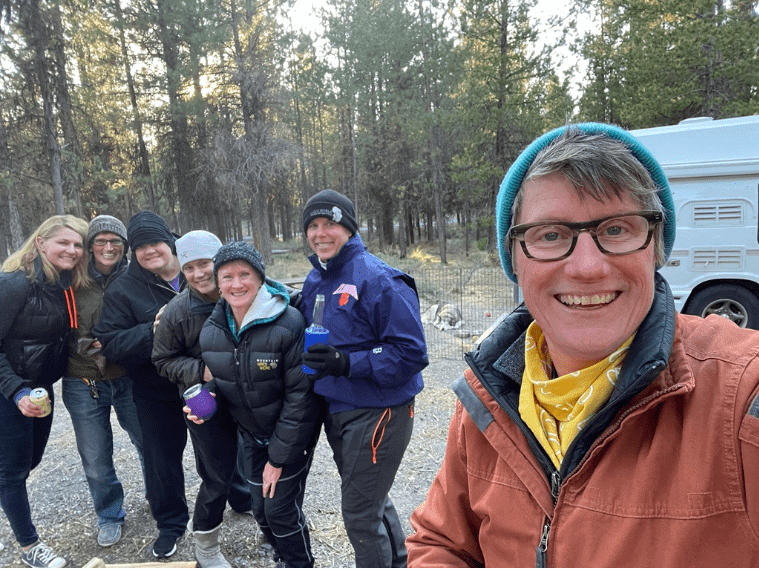
3. Empowerment
Let’s face it, there is some fear associated with setting off on your own doing something new. But when you face that fear and do it anyway, you feel a sense of accomplishment and that is empowering.
The empowerment doesn’t end there. Each time you do something that challenges yourself, whether it’s dumping your black tanks, making a repair—and there will be repairs!—or back that trailer into a tight spot, you will feel good about yourself. You’ll start to realize there are other things you maybe thought you couldn’t do, that you absolutely can. Physical endeavors, emotional ones, you name it.
When you are living solo in an RV there will be plenty of opportunities for self-empowerment.
4. You can Save Money
Living in an RV, van or trailer can be cheaper than living in a house. It can be a lot cheaper! Or, you can spend practically as much or more than living in a sticks and bricks. It’s all depends on how you travel. Sitting still costs a lot less money than driving every day. Staying in free places like on BLM or Forest Service land is a lot less expensive than staying in private RV parks. Cooking your own meals inside your RV is a lot less expensive than going out to eat all the time.
It’s important to weigh the pros and cons of how you spend money when living solo in an RV. Sometimes you need to spend a little money for your mental health. Even if you don’t “need” that piece of pie, you probably hit the road to have authentic local experiences and if that means stepping out and enjoying an adult beverage while watching a local bluegrass band, then do it! Just know, you’ll have to make up that expense somewhere else down the road.

5. If you Don’t Like Your Neighbors, You can Drive Away
When you travel with your house, you can move it you don’t like your neighbors. You can move if you don’t like the weather. You can move just to see what’s around the next bend. When you live in a sticks and bricks house, you don’t have that luxury or freedom.
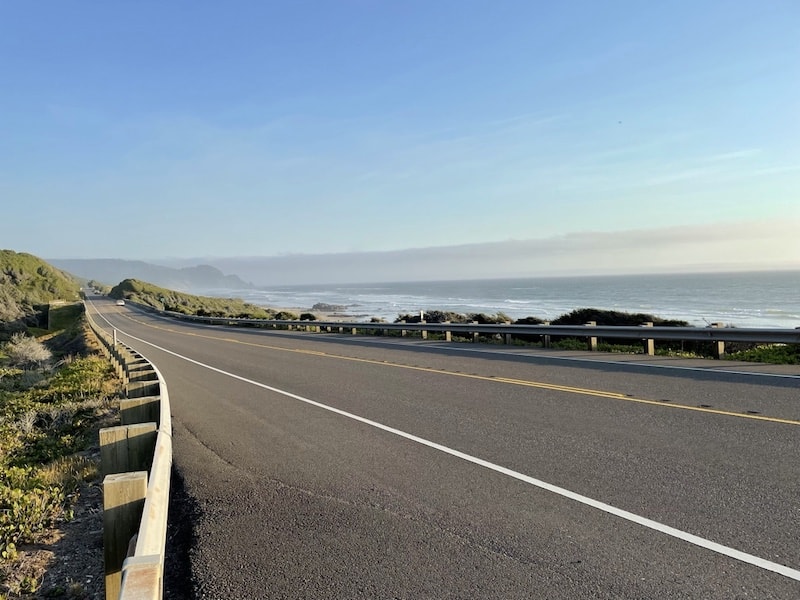
6. You Get to Live in Some Amazing Places You Couldn’t Afford to Otherwise
For years, I would vacation at the Oregon coast and dream of owning a small cottage or house there. Now that I have an RV, I don’t dream that anymore. Now I take my house with me to the Oregon coast, and the Columbia River Gorge, and Whitefish, Montana, and Yellowstone and on and on. I not only get to live in some amazingly beautiful places, I get to live in a lot of them.
7. Learn to Appreciate Experiences Over Things
When you live in an RV, space is limited. You will have to downsize and either get rid of a lot of your material possessions or put them in storage. Many RVers who put things in storage end up selling or donating them after a few months or year on the road. They realize they are paying money just to hold onto things they don’t use anymore.
Instead of collecting a lot of things, you’ll use and appreciate the things you do have and use. Rather than 10 decent knives, you’ll probably have two really good ones. Pare down your wardrobe to the essentials. You’ll get rid of those pants that never were quite flattering and only keep the ones that make you feel good about yourself.
8. Cleaning House is Quick and Easy
When you live in a small space, cleaning is so much quicker and easier. Sure, it might get cluttered and dirty quicker, but so is decluttering. When you cook, you need to clean up and put things away. A stack of dishes just won’t fly in a tiny RV space. Same with clothes. If you throw them on the bed, you can’t close the door and hide it. Taking a few minutes each day to tidy up and you’re done.

9. Follow Your Passions
Living in an RV allows you to pursue other passions in a way that living in a house or apartment doesn’t. If you love live music, you can use your RV to travel to concerts and shows. I planned all of my Fall travel one year around a concert in Red Rocks, Colorado. If you love quilting, you can travel to quilt shows. Go golfing in all the best golf courses or hike, bike and kayak in stunning environments. And then you have your home right with you for a good nights sleep.
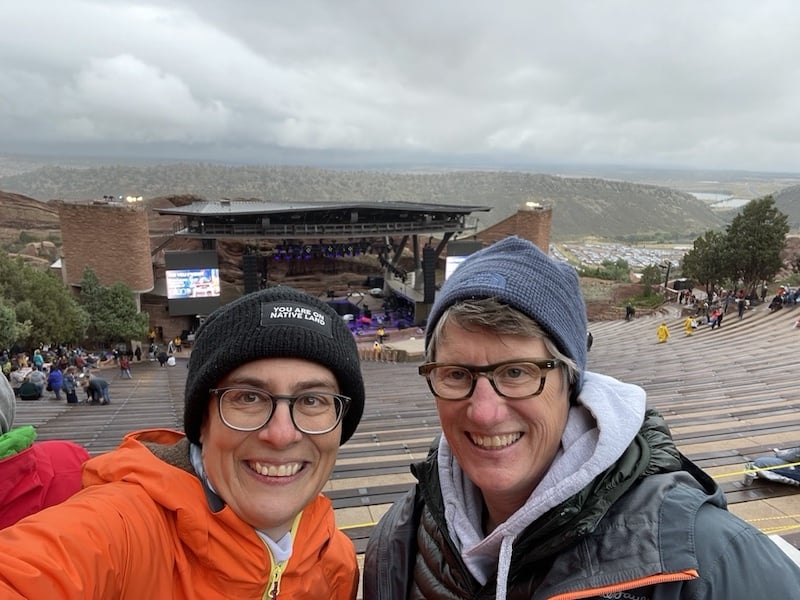
10. Follow Good Weather
I live in a part of the country that gets rainy and cold during the winter. Most of my RV friends jump in their rigs and head toward Florida and Arizona during the Fall and Winter. Likewise, these same friends who travel south, start their journey back north when the temperatures start to rise in the Spring. Having a mobile home means you can travel with the seasons. But even from day to day, you can move around when you see inclement weather in the forecast.
A few years ago when we had an unprecedented “heat dome” with temperatures over 100 degrees in Portland, I jumped in my RV and headed to the coast where the temps were about 30 degrees cooler. I felt like I’d hacked life! It was pure bliss.
When the temperatures rise in the summer, many RVers go higher. There can be a 5 degree F temperature change for every 1000 feet of elevation gain. That’s why the mountainous states out west are so popular with RVers in the summer. (Not to mention the abundance of free camping on public lands.)
11. Being in Nature
Many of us travel in RVs to be out in nature. There’s a reason we’re attracted to forests, streams, beaches and trees. They literally heal us. Studies show that even a few minutes a day in nature can lower your blood pressure, improve cognitive function and heart health. It’s also good for your mental health. Unless you’re spending all your time sleeping in Walmart parking lots, the effects of being outdoors is wonderful for your health. I’ve got several episodes on the Solo Women RV podcast that highlight women who have turned their health around by RV living:
- Debra hit the road to die, it ended up saving her life
- Angie’s Solo Travel is healing her mental health
- Debbie experienced the healing power of RV travel
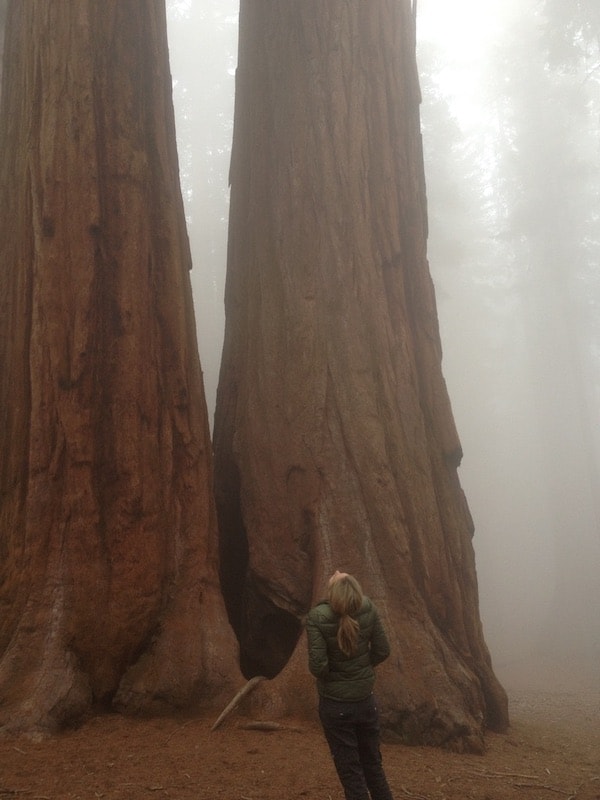
12. Voluntary Simplicity
RV living encourages minimalism—whether you choose that route or not. With less space on board, you will have less things. Simplifying your life can free up time for more adventures.
13. You Take Your Home with You
There is something to be said for having your bed with you everywhere you roam. Spending a few days hanging out with friends or family? You can enjoy their company and then retreat to your own retreat at the end of the day—or in the middle of the day if you just need some space.
Camping in a friend’s driveway, called “moochdocking” by the RV community, can also take the burden off your host. They don’t need to prepare a bedroom for you.
If you travel with pets, there are extra benefits to having your home with you. You don’t need to worry if your animals get along with others and they can feel secure in their own beds.
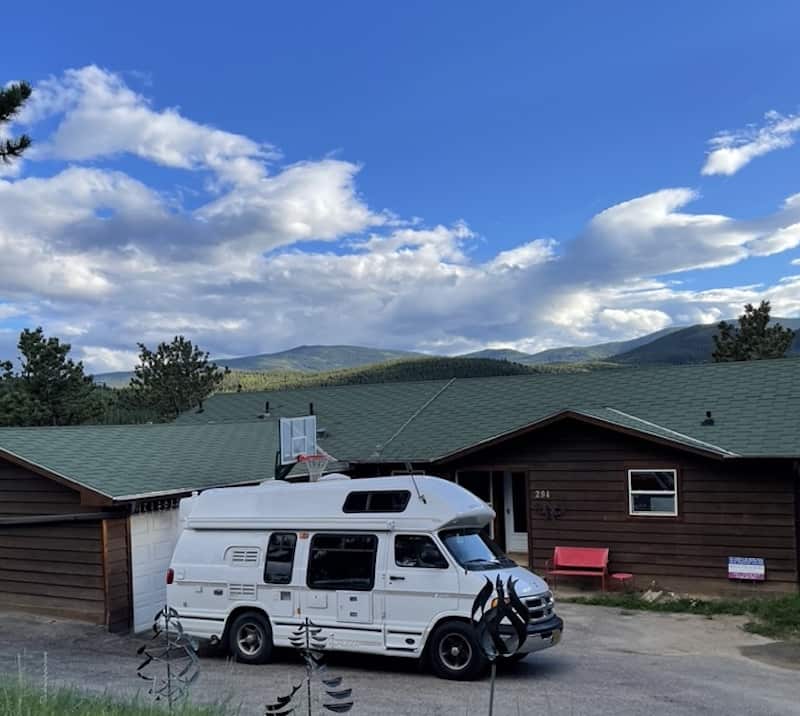
14. You get to be with your pets 24/7
Speaking of pets, another benefit of RV living is that you get to have your pets with you all the time, no matter where you travel. While some National Parks do not allow pets on their hiking trails, they are allowed inside your vehicle and anywhere vehicles are allowed—like campgrounds, parking lots and trailhead parking. So you can take your pet out for a brief respite each time you stop to see the view.
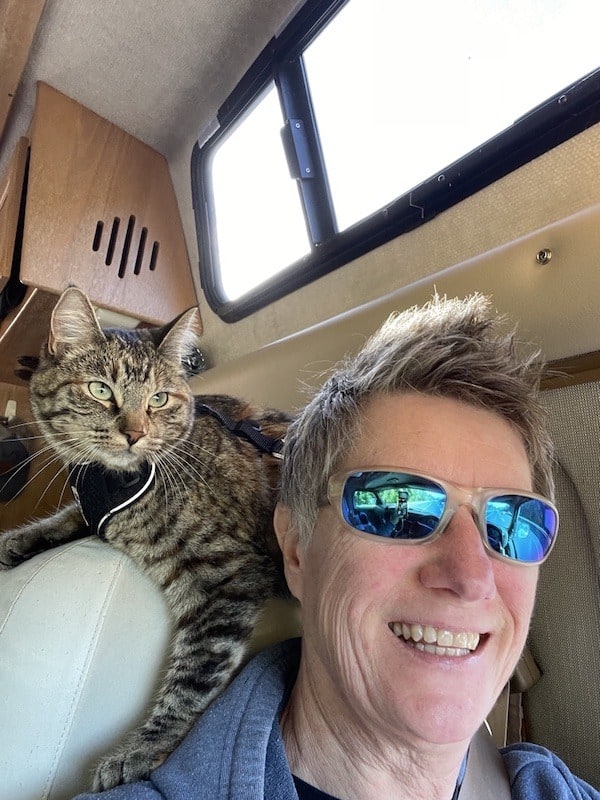
15. Pro of RV Living: Personal Growth
This may seem like an esoteric benefit of solo RV travel, but spending time on the road, by yourself, you are bound to learn things about yourself. You’ll probably discover strengths you didn’t know you had. You might also discover joys you didn’t know you needed. You’ll learn to enjoy your own company, push yourself out of your comfort zone and be a stronger person for it.
Cons of Solo RV Living
Of course, there are some negative sides to Solo RV living and travel. With freedom and flexibility, there can be a cost. You will need to decide if the cost is worth it to you.
1. Decision Fatigue
When the world is your oyster, and you can literally go anywhere, deciding where to go can become a burden. When you first start out in your RV travels, you may be excited to check all the things off your bucket list that you want to see. The National Parks are high on the list of many RV travelers. You may want to visit distant friends and family, go to the mountains, see the ocean on each side of the country, visit historic places and take one of the thousands of scenic drives all around our country.
With each of these destinations comes a thousand tiny decisions that you will need to make each day. Where to stay. How far to drive. Which route to take. Where to stop along the way. What to eat. Are the things you want to do and see within your budget? And on and on and on. Having to make these choices over and over, day after day can get exhausting.
When you are in a sticks and bricks home, many of these decisions are already made for you. You know where your bed will be, you just have to decide what time you want to walk the few feet to it. Even decisions like whether to eat in or out are not quite as complicated when you don’t have to move your whole home with you to accomplish that feat.
There is a cost to freedom of choice. While there are many benefits to having the freedom to move around, having it all at your fingertips can also be exhausting. Be prepared for that.
2. Having to do it All on Your Own
While there are many benefits to solo travel, having to do everything on your own can also be a challenge. Setting up camp. Taking down camp. Shopping. Cooking. Menu planning. Deciding where to go. Assessing the safety of a certain route or overnight destination. Traveling without a companion is certainly empowering and you have the autonomy where and when to go, but you also have the burden of doing it all on your own.
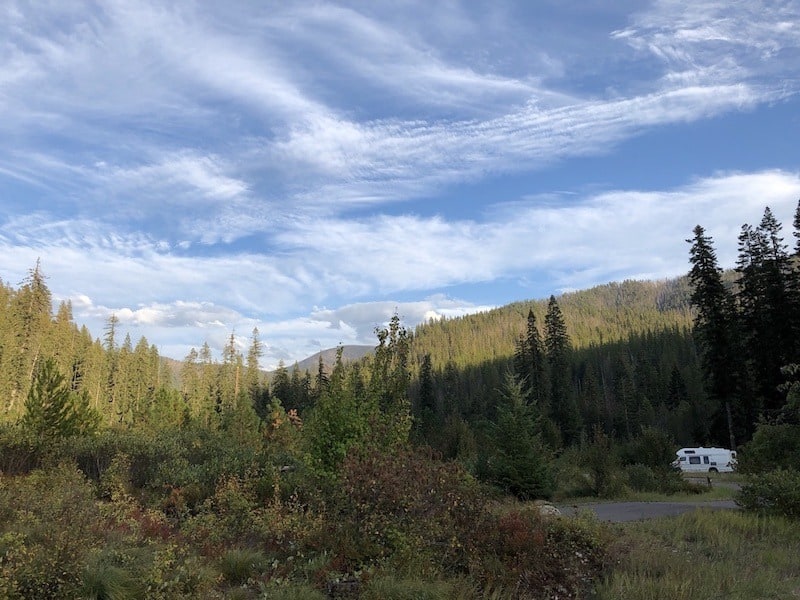
3. No one to Split Expenses With
Sometimes they call this the solo tax. When you’re solo, you have to pay full price for each campsite, tank of gas and park entrance fee. If you had a companion, you could split the costs with them.
4. Maintenance and Repairs – No one to Troubleshoot with
RVs break all the time. You’re driving your home down the road at 65mph, up and down mountains and down bumpy roads. While RVs are built to take some of this wear and tear, eventually something will go wrong. A cabinet will fall off, your plumbing will leak or some wiring will come loose. And when that happens, you’re on your own to diagnose and repair the problem.
Likewise, RVs need regular maintenance. When it comes time to reseal the roof, you’ll have to climb up there and do it on your own. Even something as simple as putting a cover over your RV will be a two-person job. Each winter I need to recruit a friend to come help me put the cover over my RV to protect it from the rain and snow.
Be sure to travel with a basic tool kit, your owner’s manual and a basic understanding of how things work, so that you can handle any small repairs as they come up.
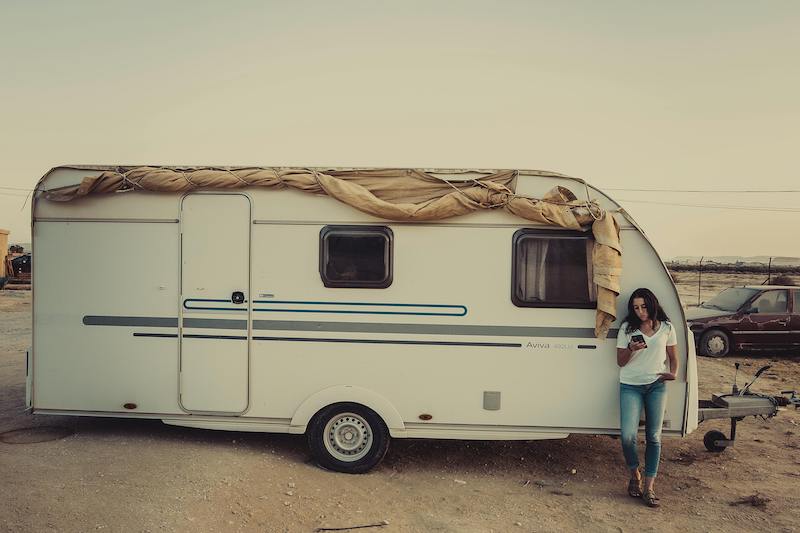
5. Break-Downs
Your RV home is now tied to an engine. Whether you tow a trailer or drive a class A, B or C RV, you will probably, at some point, have a breakdown or some kind of mechanical issue. These can be the most stressful things for RVers. You may be in a strange place, with no cell service and not know where to go for repairs.
You can be sitting on the side of the road for hours while you wait for a tow truck . Any RVer knows this is a stressful event, and even more so when you are solo.
Traveling in an older Class B RV, this has happened to me a few times. The most memorable was in Yellowstone National Park. The most stressful was on the median between an onramp and a major highway. Both times I was alone and that made the situation even more stressful. In each case, I also had a pet to be concerned about. One of the incidents I was outside of cell coverage and had to ride my bike about 5 miles to get a signal to call for help.
Break-downs will happen when you RV. Whether it be a tire blowout, or something more serious like a blown transmission, being stranded when you’re solo is extremely stressful. Make sure you have a plan for what you will do when it happens to you.
Get a good roadside assistance program like those offered by AAA, Good Sam or your insurance company.
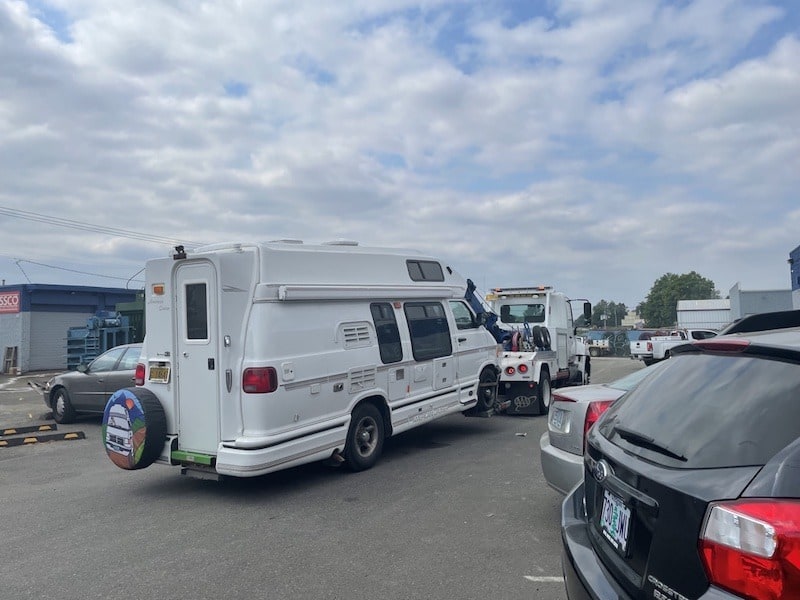
6. Finding Places to Park
Whether you’re towing a big 5th wheel or even in a regular size van, finding a place to park while living in an RV can be a pain. Going to places like the grocery store, getting gas, visiting a fast food restaurant or sight-seeing in town are all much harder in an RV than in a regular car. Even in my relatively small Class B RV, I sometimes have a hard time in places like Trader Joe’s – one of my favorite places to buy road food.
Sometimes you have to park far away from where you want to be. I’ve even skipped a spot I wanted to visit because the parking was going to be too hard to maneuver. This is definitely a bummer.
7. Visiting Crowded Areas like Cities and busy National Parks
Likewise, visiting crowded places like cities and can be a bit tougher as a solo. Navigating traffic is easier if you have a co-pilot to help direct you.
8. Loneliness is a Con of Solo RV Living
A big disadvantage of solo RV travel is loneliness. Sometimes you just want to share your day with someone. You see an amazing sunset and you wish you had someone to share it with. Loneliness is real and it does happen. You should prepare for loneliness. It’s ok and doesn’t mean you should abandon your travels.
I wrote a whole blog post about ways to cope with loneliness in solo travel.
Here are some ways I beat loneliness as a solo traveler.
9. No one to Share Navigation and Driving
Driving and navigating in an unknown environment can be stressful in a big rig like an RV. When you’re traveling with a partner, you will have someone to help you with the navigation and driving.
While GPS devices can help, there will be situations when you might want to look for a things like a good place to pull off, avoid traffic or just see what attractions are along your route. All of that is hard to do while driving. You’ll have to pull over to peek at your map or phone.
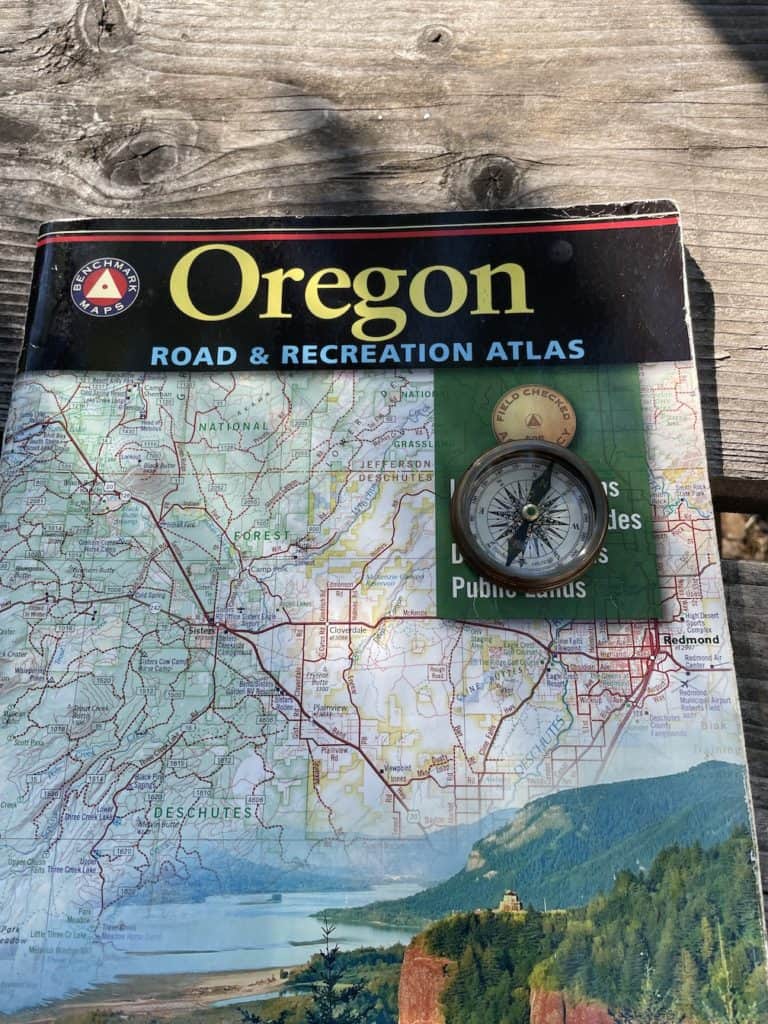
10. No One to Help with Parking and Backing Up
No matter how good you are at backing up, there will come a time when there is a tight space or an unseen hazard where having an extra set of eyes could be helpful. As a solo living in your RV, you’re on your own parking and backing up your camp spots. You’ll learn to get better at this as you practice more, but even the most experienced RVers often use a spotter to get into their campsites.
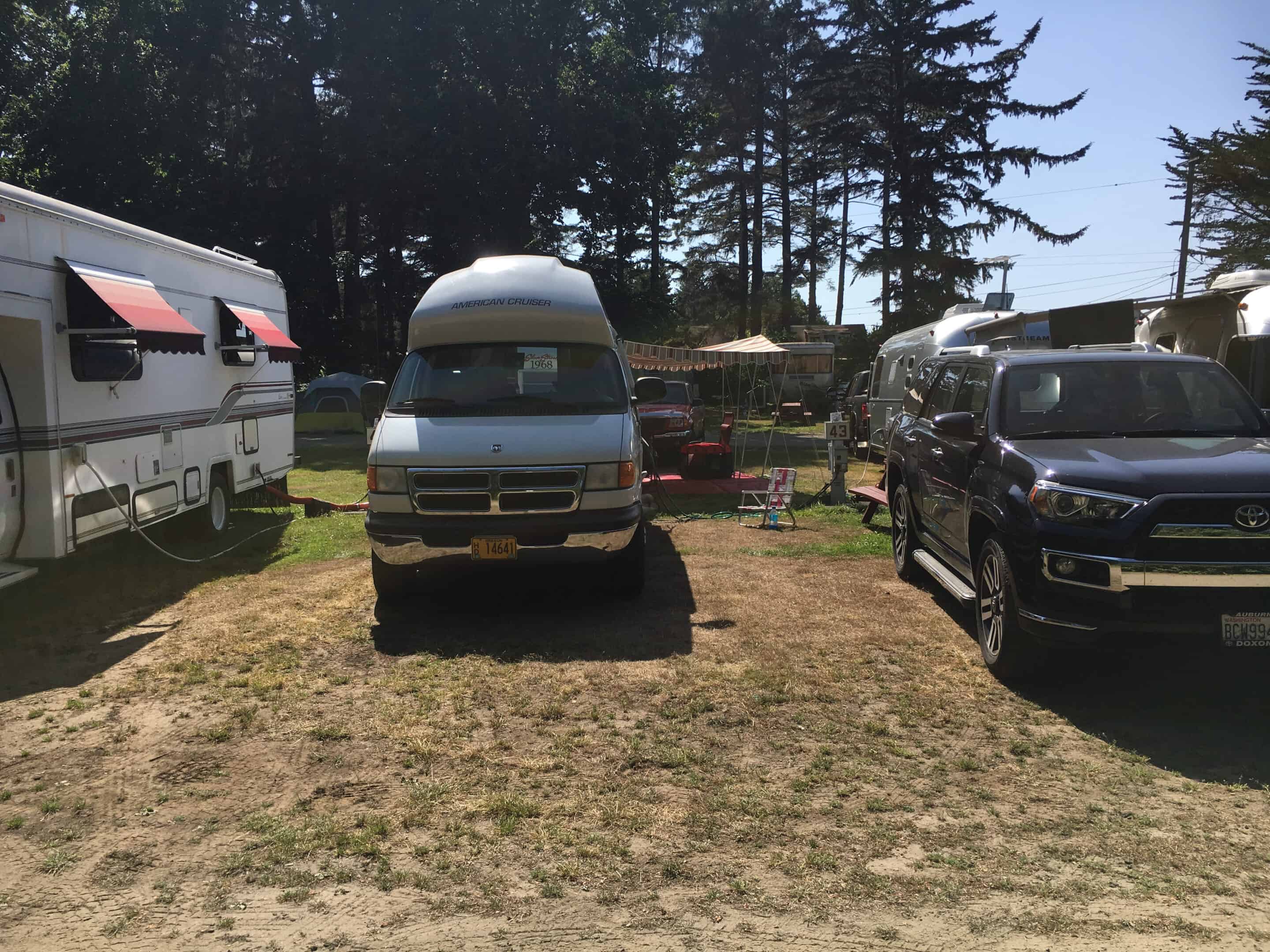
11. Weather Extremes and Hazardous Driving Conditions
Extreme weather can be one of the most challenging aspects of RV living. Having a deal with high winds, blizzards or torrential downpours on your own is a scary prospect. Having a good weather app will help you anticipate upcoming conditons.
12. Accessing Healthcare
Getting sick is no fun. When you travel solo, getting sick or injured can be anything from a nuisance to life-threatening. You may have a chronic condition that needs regular medical care or you might just need to get your yearly mammogram and check-up. When you live in an RV fulltime, finding medical coverage, let alone care can be a challenge. Do your research and make sure you have a plan for accessing doctors and care while on the road.

13. Lack of a Proper Shower
Modern RVs have amazing amenities. Many of them have bathrooms and showers. RVs with showers are great, but don’t think they’re going to be like the shower in your home. Usually the quarters will be tight. And you will be limited in how much water you have on board. When you live fulltime in an RV, quick navy style showers are the norm. And don’t expect to shower every day either. You’ll quickly deplete your onboard water supply if you do and fill up your grey water tank.

14. Finding Good Internet
Finding good internet connection is probably one of the biggest hassles of full time RV living. Many times RVers want to be out in remote areas, but often remote areas have poor cell reception and connectivity suffers.
There are ways to get around this, but no solution is perfect. You can get a cell phone booster or even invest in a Starlink, but each of these has their down-sides, not the least of which is expense.
15. Hiking and Adventuring Alone
Many of us travel to get to the places where we can be out in nature. We love to bike, hike, kayak, paddleboard and rock climb. While these are all great activities to do on your own, there is an added risk to adventuring solo. Make sure you have a friend or family member who knows where you are, take safety precautions and consider carrying a satellite device such as the Garmin InReach.

Conclusion: Pros and Cons of Solo RV Living
Like everything in life, living and traveling solo in an RV has both pros and cons. On the one hand, you’ll have a life filled with freedom, adventure and self-discovery. You’ll get to explore diverse landscapes and connect with nature. Moreover, the solitude can be a great source for personal growth and introspection.
However, this lifestyle isn’t without its challenges. Safety concerns, occasional loneliness, and the need for self-reliance can pose significant obstacles. Additionally, the financial implications and maintenance responsibilities associated with RV living should be carefully considered.
Ultimately, the decision to embrace solo RV living depends on you preferences, priorities, and comfort levels. For some, the benefits outweigh the drawbacks, offering an unparalleled sense of independence and exploration. For others, the challenges may outweigh the allure of this lifestyle. Finding a balance between the pros and cons is key to enjoying the fulfilling and enriching experience that solo RV living can offer.

